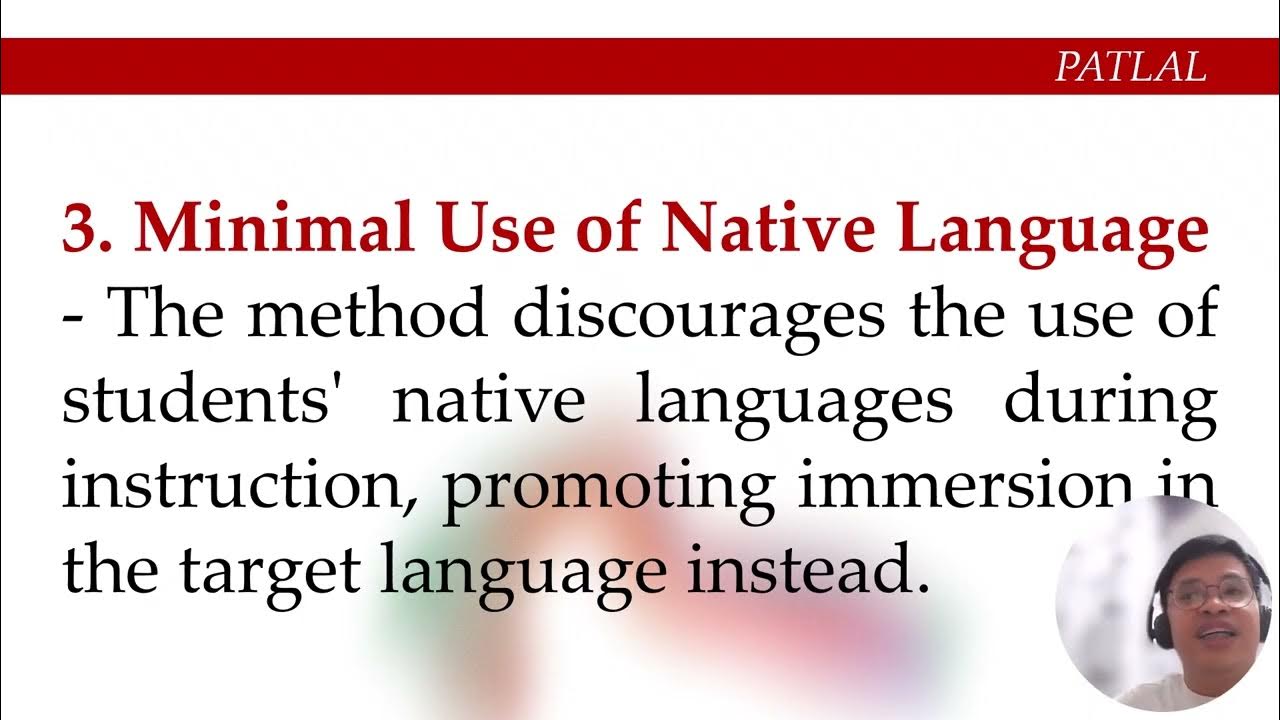What's wrong with the grammar syllabus?
Summary
TLDRIn this video script, the speaker critiques the traditional grammar-first approach to second language instruction, arguing that grammar syllabuses focus too much on static rules rather than the dynamic, communicative process of language learning. They present nine reasons for this, including the discrepancy between real-world language use and textbook grammar, the neglect of spoken language, and the failure to account for collocations and formulaic chunks. The speaker advocates for a more fluid, context-based approach, where grammar emerges naturally from communication rather than being taught in isolation.
Takeaways
- 😀 Grammar syllabi focus on the 'product' (final grammar rules) rather than the 'process' of how grammar is internalized by learners.
- 😀 Language corpora reveal a mismatch between the grammar taught in traditional syllabi and how language is actually used in real-life spoken and written contexts.
- 😀 Spoken and written grammar differ significantly, but traditional grammar syllabi often emphasize the grammar of written language for both writing and speaking.
- 😀 The traditional grammar syllabus overlooks phraseology, collocations, and formulaic chunks, which are essential to fluent, real-world communication.
- 😀 Grammar emerges from communication rather than being a prerequisite for communication, meaning it should be taught in context rather than upfront.
- 😀 Focusing solely on grammar forms in the syllabus neglects the meaning and communicative function of language, which learners prioritize.
- 😀 Traditional grammar syllabi fragment language into granular 'grammar McNuggets,' leading to a transmissive teaching model instead of a more interactive, dialogic one.
- 😀 Explicit teaching of grammar (through rules and forms) can hinder the development of implicit knowledge, which is crucial for fluency in real-time communication.
- 😀 Grammar should be learned implicitly through exposure, as it aids in fluent language production, whereas explicit knowledge is slower to deploy and more accurate but less useful for fluency.
- 😀 A backwash effect occurs when grammar-focused course books skew the content to prioritize grammar, undermining the authenticity of language learning materials.
Q & A
What is the main argument against starting language instruction with a grammar syllabus?
-The main argument is that a grammar syllabus focuses on the 'product' (the final language structure) rather than the 'process' of how learners acquire language. Grammar acquisition should be seen as evolving through communication, not as something to be dissected from pre-established rules.
How does the 'process vs. product' problem affect language teaching?
-The 'process vs. product' problem suggests that focusing on grammatical rules derived from linguistic descriptions after the fact doesn’t account for how grammar is actually internalized by learners. Grammar should emerge through language use, not just be taught as a static set of rules.
What does the Corpus argument reveal about traditional grammar syllabi?
-The Corpus argument highlights the gap between grammatical information in traditional syllabi and actual language use. Studies based on corpora show that language teaching often focuses too much on verb phrases and neglects other areas like noun phrases, which are more prominent in natural language use.
Why is there a difference between spoken and written grammar?
-Spoken and written English have different grammatical structures, yet traditional grammar syllabi often teach the rules of written grammar for both speaking and writing. For example, backshifting in reported speech is common in writing but rarely used in spoken language, which leads to a mismatch between taught grammar and actual use.
What is meant by the 'phraseological argument' in the context of grammar syllabi?
-The phraseological argument refers to the importance of language chunks, collocations, and formulaic expressions that fall outside of traditional grammar and vocabulary. These elements, which make up a significant portion of spoken language, are often overlooked in grammar syllabi.
How does language 'emerge' through communication according to the speaker?
-Language emerges from communication as learners are exposed to real-world language use. Grammar is a byproduct of communication, and it evolves as learners interact with language in context, rather than being something they must first master before using the language.
What is the issue with focusing on grammatical 'forms' rather than 'meanings'?
-Focusing on grammatical forms (like tenses and structures) without considering meanings can be counterproductive. Language learners are more concerned with expressing meaning effectively, and an overemphasis on form can hinder their ability to communicate fluently.
What does the 'grammar McNuggets' argument refer to?
-The 'grammar McNuggets' argument criticizes the way grammar is broken down into discrete, granular chunks in traditional syllabi. This approach mirrors a fast-food model of language learning, where knowledge is delivered in isolated units, which may not facilitate meaningful language use or deeper understanding.
What is the difference between implicit and explicit knowledge in language learning?
-Implicit knowledge is the natural, intuitive understanding of language that develops through exposure and experience, contributing to fluency. Explicit knowledge, on the other hand, involves consciously learned rules and structures, which can aid in accuracy but often hinder fluency in real-time communication.
How does a grammar-first syllabus create a 'backwash effect'?
-A grammar-first syllabus can lead to a 'backwash effect' where course materials are designed primarily to reinforce specific grammatical structures, often at the expense of authenticity and subject matter. This can result in a lack of engagement and a disconnect from real-world language use.
Outlines

Этот раздел доступен только подписчикам платных тарифов. Пожалуйста, перейдите на платный тариф для доступа.
Перейти на платный тарифMindmap

Этот раздел доступен только подписчикам платных тарифов. Пожалуйста, перейдите на платный тариф для доступа.
Перейти на платный тарифKeywords

Этот раздел доступен только подписчикам платных тарифов. Пожалуйста, перейдите на платный тариф для доступа.
Перейти на платный тарифHighlights

Этот раздел доступен только подписчикам платных тарифов. Пожалуйста, перейдите на платный тариф для доступа.
Перейти на платный тарифTranscripts

Этот раздел доступен только подписчикам платных тарифов. Пожалуйста, перейдите на платный тариф для доступа.
Перейти на платный тарифПосмотреть больше похожих видео
5.0 / 5 (0 votes)






